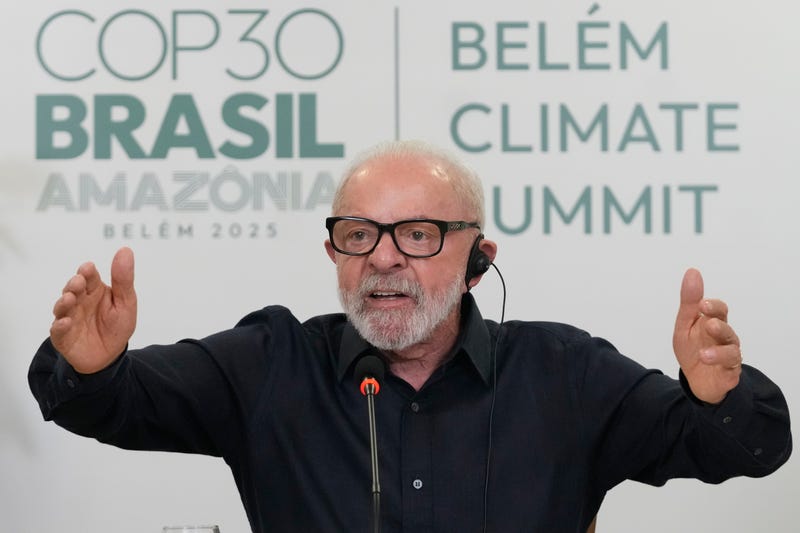
BELEM, Brazil (AP) — Brazilian President Luiz Inácio Lula da Silva on Tuesday put forward his vision for how the Amazon rainforest should be protected, a future that didn't depend on donations from wealthy nations and large philanthropies but instead included a major fund that paid countries to keep forests standing.
“I don't want to say the word donation any longer,” Lula told reporters ahead of the United Nations’ climate summit, known as COP30, which begins this week in Belem, a Brazilian city in the edge of the Amazon.
“Someone gives us $50 million. It is nice, but that’s nothing," he said. "We need billions to deal with our problems, problems of people who are (living) there.”
In Belem, Lula is expected to launch an initiative named Tropical Forests Forever Fund, aiming to support more than 70 developing countries that commit to preservation. So far, Colombia, Ghana, the Democratic Republic of Congo, Indonesia and Malaysia have joined.
Germany, the United Arab Emirates, France, Norway, and the United Kingdom are helping shape the mechanism and likely will be its first investors, which Lula hopes will help boost interest from the private sector. Brazil's president did not provide more details about how the plan would come to action.
The official COP30 website describes the initiative as a “permanent trust fund” that would generate about $4 from the private sector for every $1 contributed. How that would happen wasn't immediately clear. However, forests can generate money in various ways beyond extracting resources, such as tourism and carbon offsets, which can involve companies paying to cancel out their pollution by planting trees and protecting forests.
If the initiative works, resources will be sent to countries that keep their tropical forests.
“Brazil has already invested $1 billion, and this will bring revenue to investors,” Lula added. “It is a win-win fund. We hope that when we finish the TFFF presentation many countries join.”
Lula also defended his government's recent decision to approve exploratory drilling by state-run oil-giant Petrobras near the mouth of the Amazon River.
The Equatorial Margin deposit off the coast of Brazil, which stretches from Brazil’s border with Suriname to a part of the country’s Northeast region, is believed to be rich in oil and gas.
The exploratory drilling block lies 175 kilometers (108 miles) offshore the northern Brazilian state of Amapa, which borders Suriname. The biodiverse area is home to little-studied mangroves and a coral reef. Activists and experts have said the project risks leaks that could be carried widely by tides and imperil the sensitive environment. Petrobras has long argued it has never caused spills in its drillings.
“If I was a fake and lying leader, I would wait for COP to be finished (to give approval)," Lula said. “But if I did that I would be a small man before the importance of this.”
Lula, Brazil's president for two terms early in the 2000s before returning for a third term in 2023, has long cast himself as both a steward of the environment and pragmatic. Brazil is a major oil exporting country, and revenues brought in by Petrobras help fund any government's agenda. At the same time, Lula's administration has worked to curb deforestation and take a leading role in climate negotiations by hosting the summit.
“I don't want to be an environmental leader. I never claimed to be,” Lula added. “I want to do the right things that specialists, my administration and my conscience say we have to do. It would be incoherent, an irresponsible action, if I said we will no longer use oil.”
___
The Associated Press’ climate and environmental coverage receives financial support from multiple private foundations. AP is solely responsible for all content. Find AP’s standards for working with philanthropies, a list of supporters and funded coverage areas at AP.org